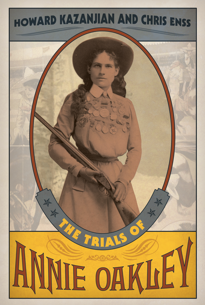
Say the name Annie Oakley and the image of a young woman who could shoot targets out of the sky without a miss and rode across the frontier with Wild West showman Buffalo Bill Cody comes to mind. Annie Oakley was a champion rifle shot and did perform alongside well-known riders, ropers, and Indian chiefs in Colonel Cody’s vaudevillian tour, but there was more to Annie Oakley’s fame than her skill with a gun. The diminutive weapons wonder was a strong proponent of the right to bear arms, a noted philanthropist, and warrior against libel who fought the most powerful man in publishing and won.
The native Ohioan astonished the world with her almost unbelievable feats of rifle marksmanship. She could pepper a playing card sailing through the air, puncture dimes tossed into the sky, and break flying balls with her rifle held high above her head. She once shot steadily for nine hours, using three sixteen-gauge hammer shotguns which she loaded herself, breaking 4,772 out of 5,000 balls.
Annie Oakley fell in love with and married the first man she defeated in a rifle match. Frank E. Butler was one of the most noted marksmen in the West and he and Annie were married for more than fifty years. The couple never had any children of their own. The reasons they were childless are varied and speculative at best. What is not without question is how Annie helped fund the care and education of orphaned children from coast to coast.
Annie Oakley was a combination of dainty, feminine charm and lead bullets, adorned in fringed handmade fineries and topped with a halo of powder blue smoke. She had a reputation for being humble, true, and law abiding and was careful with her character at all times. When powerful, newspaper magnate William Randolph Hearst challenged her honor and questioned her respectability in his publication in 1903, Annie filed a lawsuit against him that’s still discussed at universities today.
Annie’s experience with Hearst wasn’t the only trial she encountered in her celebrated life. A couple of motor vehicle accidents left her in constant pain, subjected her to numerous back surgeries, and resulted in Annie having to wear a leg brace. There were other struggles as well, some just as stifling as a leg brace.
Although Annie’s position on what women should be allowed to do was progressive for the time (she believed in equal pay and in women’s right to carry a gun) she was not for women’s suffrage. Her chief concern was that not enough “good” women would vote. Annie wasn’t political in that sense. She tried for years to convince the government to allow her to recruit a team of women sharpshooters to fight for the country, but was never successful. Public servants dismissed the firearms expert’s idea outright, but Annie never fully abandoned the notion.
The incomparable Annie Oakley suffered through numerous heartaches in her lifetime, the death of her father in 1866, her mother in 1908, her beloved dog, Dave in 1923, and her dear friend, Buffalo Bill Cody in 1917. She was also forced to deal with reports of her own death in 1890. “I am indeed, very grateful for your many kinds words in my obituary,” she wrote the editor at a Cincinnati, Ohio, magazine. “How such a report got started I do not know. I am thankful to say I’m in the best of health.”
Annie and Frank battled imposters trying to use Oakley’s famous name to gain work at theaters and rodeos and endeavored to tolerate brash rivals like Lillian Smith, who was hired by Buffalo Bill Cody to appear in the Wild West show. Lillian was younger than Annie and she was braggadocios and flirtatious with the male cast members of the Wild West show. Her unladylike behavior contributed to Annie’s eventual departure from the program, a way of life that had been a constant for her for more than sixteen years.
Only those close to Annie were aware of the difficulties she experienced. She handled every trial that came her way with such dignity and grace it was easy for the general public to believe she never had a worry, but nothing could have been further from the truth.
The Trials of Annie Oakley describe the hardships the peerless lady wing shot overcame, from her early life using her marksmanship as a means of providing food for her widowed mother, brother, and sisters, to her final days dealing with all the symptoms associated with pernicious anemia. It is the story of a young woman who survived scandal and misfortune to become a true American hero.

